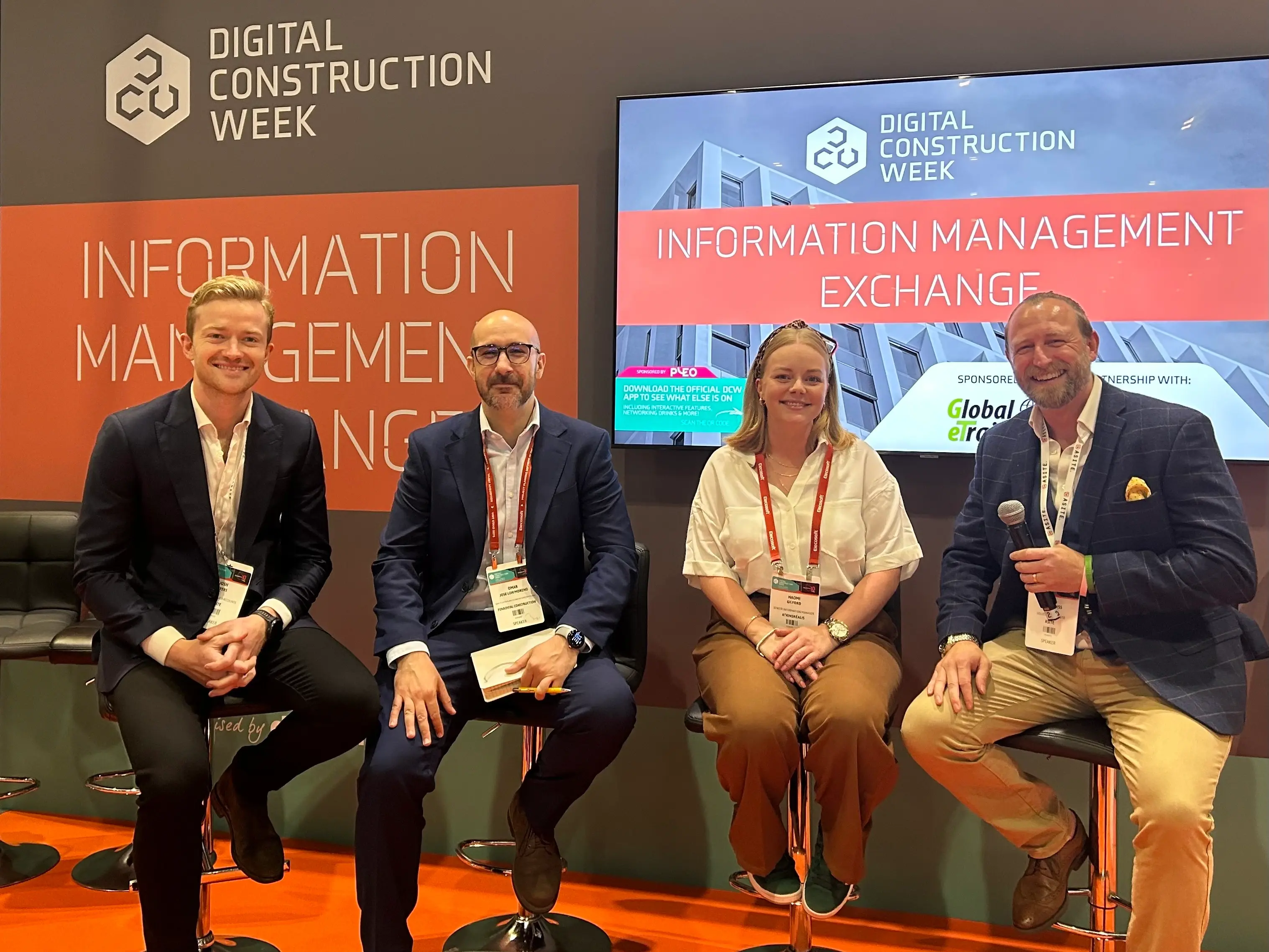
From AI and automation to new expectations around collaboration and compliance, Digital Construction Week 2025 was packed with insights shaping the built environment.
Whether you missed the event or want a quick recap, here are three key takeaways from the event you don’t want to miss.
1. AI can’t succeed without information integrity
AI was everywhere at DCW—from generative design to predictive analytics—but behind the headlines was a consistent reminder: AI is only as good as the information you feed it.
That theme was reinforced on the Main Stage by speakers like George Mokhtar (Turner & Townsend) and Sean Hicky (Finna Construction). Their discussion on the Future State of Construction highlighted the need for a shift from hindsight to insight—and increasingly, from insight to foresight. But achieving that foresight relies on data that is structured, accessible, and trustworthy.
“We’ve got data coming out of our ears,” said Lorna Killik, Head of Business Transformation at BW: Workplace Experts—but access doesn’t always equal usability. Silos persist. Data quality varies. And without the right training and mindset, people often struggle to manage or interpret the information they already have.
For information management, this means doubling down efforts on integrity, interoperability, and user education. Training people to think differently about data—and to structure it for re-use—will be critical to unlocking the next wave of innovation.
Key takeaway: Unlocking AI’s potential in construction starts with getting information integrity and management right.
2. Information management needs to scale beyond the information manager
The Information Management Initiative (IMI), now 18 months into its journey, is helping lead the charge toward better information practices across the entire supply chain. But as discussed during a packed panel, success isn’t just about frameworks—it’s about changing how organisations think.
Too often, information management is treated as someone else’s responsibility. The IMI aims to embed information management thinking at every level—from procurement and project delivery through to asset management. As one panellist noted, “Stop thinking project—start thinking organization.”
The IMI promotes an approach where every role contributes to quality information, guided by consistent principles and simplified standards.
Key takeaway: If we want information to serve us tomorrow, we need to manage it properly today—and that’s everyone’s job. Everyone should think of themselves as an information manager.
3. A call to recentre the true meaning of the ‘CDE’
At DCW 2025, a lively panel tackled growing concerns about the misuse of the term “Common Data Environment.” With many platforms now claiming to be CDEs—despite lacking ISO 19650 compliance or structured workflows—the industry risks confusing file storage with the core requirements of a CDE.
Speakers highlighted a common concern: clarity and integration are critical to the future of CDEs.
Naomi Gilford (AtkinsRéalis) warned that when platforms blur definitions, it erodes trust in digital processes. Omar Jose Loh Moreno (Ferrovial Construction) stressed the importance of integration—CDEs must connect with the wider digital ecosystem to avoid becoming siloed. Josh Myers (Asite) brought it back to basics: a CDE isn’t just a document store, but a standards-driven space that links people, processes, and data. In an AI-powered future, getting this foundation right is more vital than ever.
Key takeaway: ISO 19650 standards should be central to defining what a Common Data Environment (CDE) truly is—ensuring consistency, clarity, and interoperability in information management across the construction sector.
Final thought: the future is structured, connected, and people-powered
Digital Construction Week 2025 showed that technology is evolving fast, but it’s how we manage, connect, and interpret information that will define the future of the industry.
We’re entering a new era where AI, robotics, and automation support a faster, more efficient, and more sustainable construction process. But none of it works without good information management.
Success lies not in collecting more data, but in asking better questions, building better structures for information exchange, and making sure the right people can act on the right insights—at the right time.
If DCW offered a glimpse into construction’s future, the message for information professionals is clear: those who aren’t preparing their data for AI risk being left behind.
Learn about Asite's AI-powered Information Management System — Asite’s Cognitive CDE™
2 minute read
Asite Insights in your inbox.
Sign up for product news and our latest insights published monthly. It's a newsletter so hot, even global warming can't keep up.


